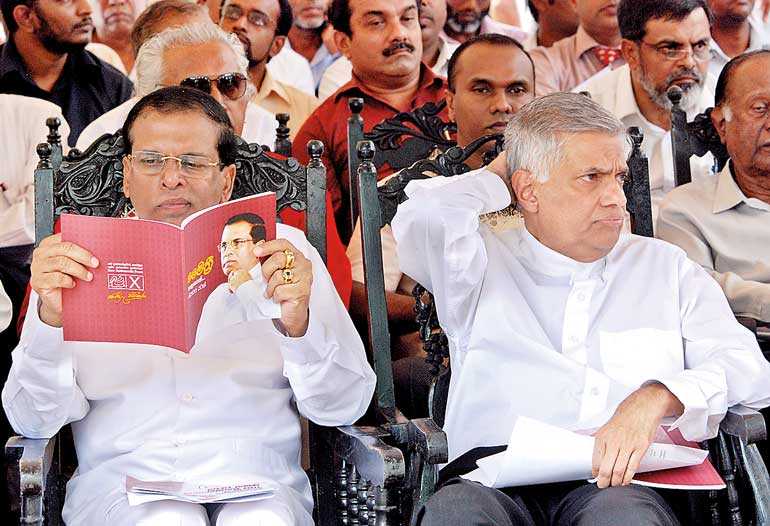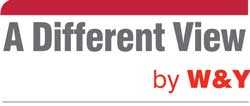Sunday Feb 22, 2026
Sunday Feb 22, 2026
Tuesday, 29 January 2019 01:32 - - {{hitsCtrl.values.hits}}

What are the political ideologies of the political parties? What do the swan (NDF), lotus bud (SLPP) or even the longstanding parties such as UNP and UPFA for that matter, stand for?
Blurring of political boundaries
The UPFA is supposedly the more left wing and less private sector and foreign investor friendly. But then how do you explain that it’s the UPFA Government that brought down the corporate tax rates and sold prime real estate in Colombo to a foreign investor like Shangri-La?
The UNP is supposedly the more right wing and private sector friendly and less public sector friendly. But then how do you explain that it’s the UNP-led regime that proposed arguably the highest salary increase in the history for the Government sector? Or the imposition of ‘Super Gain Tax’ on the private sector? Or the fact that the stock market has been on a declining trend pretty much throughout the UNP led regime?
The truth is, the lines have been blurred. It is increasingly difficult to figure out what each political party stand for.
Rise of personalities
The trend seems to be to gather political support around personalities. Political alliances are formed without defining a political or economic ideology. The DNF or SLPP are good such examples while UNP and UPFA may not be much better in terms of what they stand for currently.
Alliances are formed with political parties that have a voter base (due to ethnicities, social class or personalities), not based on a political or economic vision. Celebrities such as actors and sportsman enter the political arena and end up obtaining substantial support from voters, despite the absence of a clear view.
While the rise of personalities per se may not be a bad thing, what is bad is the absence of a concrete, clear view or a specific vision and a plan for the economy.
No pure left or pure right in the world
At a recent political discussion, the moderator asked one participant (who happens to be a lesser known contender for the upcoming Presidential Election) the economic theory he proposes for the country. He seemed a little rattled by the sudden technical nature of the question, but hastily said “Mixed”. Of course it should be “Mixed”! Do we have any pure “Right” or “Left” economic policy in any successful economy in the world?
The USA, which is the leader of the capitalist world, saw its Government bailing out the largest private banks during the financial crisis in 2009 spending billions of tax payer money in a classic anti-capitalist move. Similarly the socialist, leftist regimes in China and Russia have opened up the economies so much and their private sector entities in many spheres are among the best in the world.
In short, the economic models used by various countries who have achieved stronger growth don’t belong to any extreme; they have characteristics of many models.
Different models used in different success stories
The well-known economic success stories in recent decades are Japan, Singapore, Hong Kong, Taiwan and South Korea. In the modern day, China is making rapid economic strides as well. If one analyses carefully, each of these countries adopted unique economic tools based on their strengths and the opportunities that were presented to them. No two countries could be termed as identical in their economic or political approach.
South Korea provided Government support for large private entities and hence saw the creation of global giants such as Hyundai and Samsung. Taiwan Government focused more on small entities and the inherent strength of these small companies (and of course their people) was their efficiency which helped them to successfully penetrate semi-conductor and computer industries. Singapore focused more on Government owned entities and to this date, the largest entities such as Singapore Airlines and DBS Bank are driven by the Government.
There are underlying common factors as well, but there are very clear contrasts also.
Models of theoreticians
The thing with economic theories is that they are formed in more cases by theoreticians. The fact is, the countries mentioned above which developed successfully, were spearheaded by practitioners and not by theoreticians. Arguably, they didn’t follow an economic model that was prescribed to them by a renowned theoretician.
Therefore, the key point to note is not to follow a theoretical, economic model blindly. Opening up the economy recklessly without due care has expanded Sri Lanka’s external current account deficit over the last several decades and is currently a key economic problem of the country. A strong economic plan should incorporate lessons from real world success stories but should revolve around a strong analysis of the country’s unique strengths and opportunities in the context of the global economy.
Demand a practical plan, not political alliances
In conclusion, extreme economic theories or political ideologies are increasingly irrelevant. Political parties and alliances emerge based on personalities and factions with support from specific ethnicities or social classes. However a key element that is missing is a concrete political or economic plan. That’s what the voters should demand.
The fairy-tale election manifestos without detailing how it would be achieved should not be accepted, as history clearly illustrates the achievement rate of such promises are close to zero. A mere criticism of the other party shouldn’t be a sufficient factor to vote for the party.
As Sri Lanka gets ready for a crucial election year, the voters should get ready to demand practical plans and personalities who are capable of implementing and reject alliances which are simply formed for the benefit of politicians.
(The writers could be contacted via [email protected].)